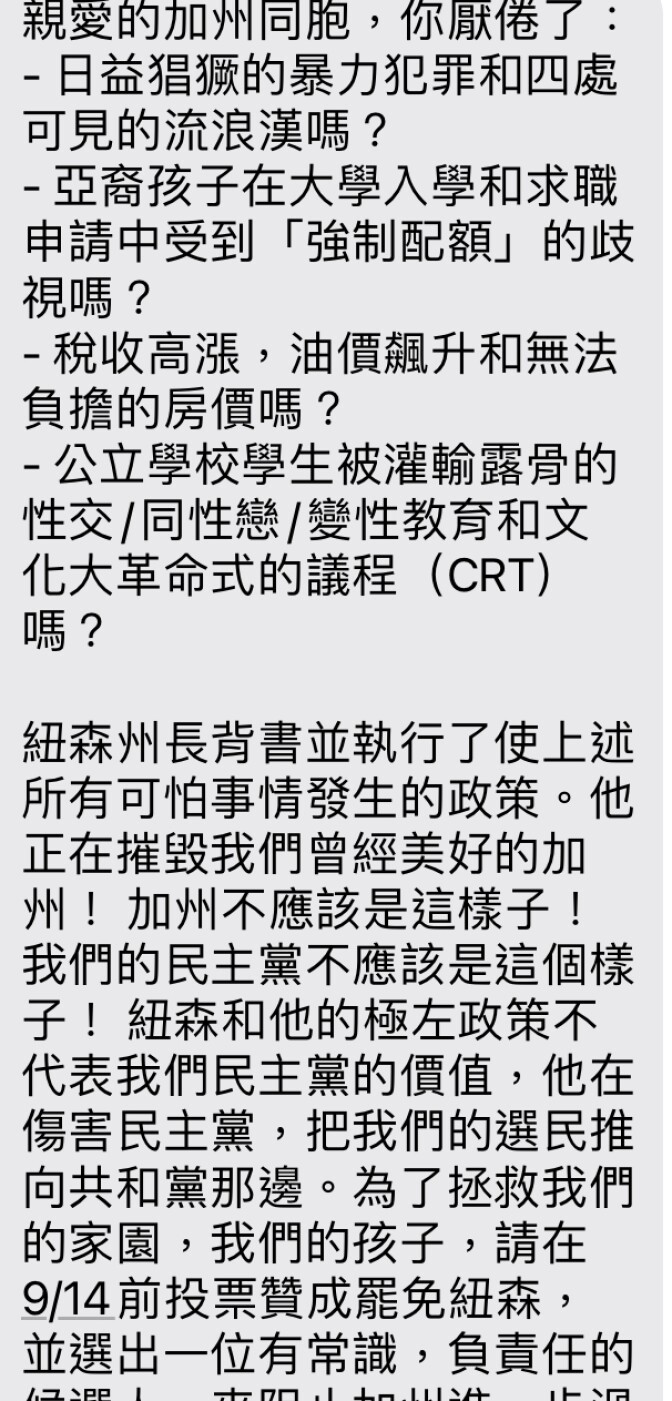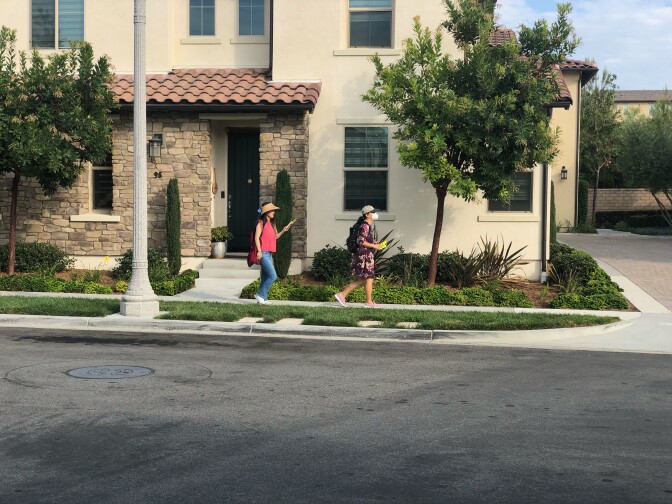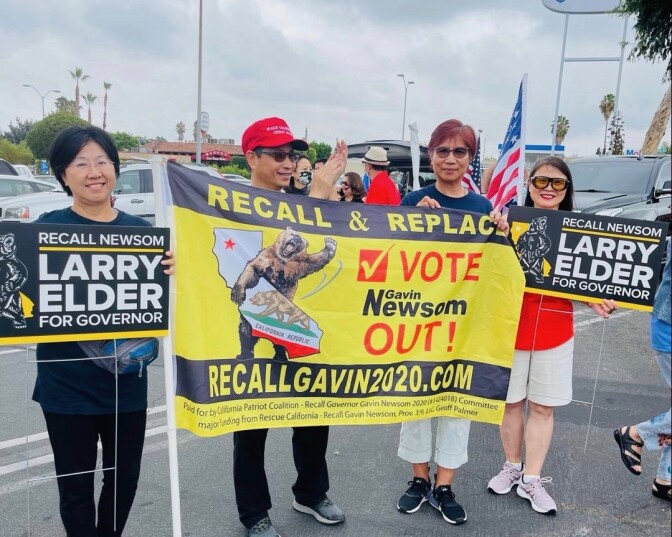With the California recall election just days away, the campaign machines for and against Governor Newsom have revved up. And as some Californians of Chinese descent discovered this week, it’s also led to some micro-targeting of voters by ethnicity.
Voter Game Plan
Aside from traditional door-knocking and phone-banking, a group of Chinese-speaking recall supporters said it’s sending anti-Newsom texts to about 200,000 voters with 25 of the most common Chinese surnames, such as Wang, Liu and Chen. This reporter was among them.
“[Newsom] is destroying our great state,” the text communicates in both Chinese and English. “California deserves better!”

Gexin Tang, an anesthesiologist from Irvine, is one of the leaders of the group behind the texts — recall supporters across the state who first organized over the Chinese messaging app WeChat last year and adopted the slogan, “We Save America."
They’re hoping to sway some Chinese Californians — one of the state’s largest Asian ethnic groups — by linking Newsom to affirmative action, which some Asian American parents believe put their children at a disadvantage in college admissions. They’re also opposed to critical race theory, the academic framework developed decades ago to address systemic racism in institutions.
Conservatives such as Tang, 63, say critical race theory is divisive and reminiscent of the Chinese class warfare that marked the Cultural Revolution of the late 1960s and ’70s.
“It’s very similar — all this cancel culture, all this ‘woke’ culture,” Tang said.
It’s not clear how persuasive the group’s texts will be. Asian American voters increasingly lean Democratic. In 2020, a majority of Chinese Americans helped vote President Biden into office, according to an Asian Americans Decisions survey. But the recall vote is a special election expected to draw a smaller portion of the electorate, typically the most informed or motivated voters.
What Recall Polls Are Finding
A Berkeley IGS poll this summer indicated that Asian American voters who say they are likely to participate in the recall election favor ousting Newsom by a slight margin — 50% to 48%. The reverse was found to be true when looking at Asian American registered voters as a whole, with more opposing the recall than supporting it — 44% to 37%.
Judy Tzu-Chun Wu, a professor of Asian American Studies at the University of California, Irvine, received the anti-Newsom text in Chinese on two consecutive days this week.
Wu opposes the recall because she said the current governor considers the collective good and the needs of marginalized communities — especially critical during a pandemic.
So she was disturbed by the Chinese texts denouncing Newsom and faulting him for everything from homelessness to crime and “explicit sex education” that organizers say creates gender confusion.
“There's a cluster of fears that are being articulated here that does resonate within certain sectors of the Asian American community about class, about gender conservatism, fears of totalitarian governments,” Wu said.

At the same time, the authors of the text appear to recognize that Asian Americans have been veering to the left by including this language:
“Democratic Party deserves better. Newsom and his radical left policies do not represent the value of our party. He is actually destroying our party and pushing our voters to the other side!”
Tang, for her part, said she is an independent who stopped voting for Democratic presidential candidates in 2008.
Another organizer, George Li, declined to give his political affiliation, but like Tang said he supports the leading Republican recall candidate, Larry Elder.
A New Strategy
Li has been helping to oversee the texting campaign for their group and said the Chinese-language messaging is a new strategy — one made easier by the fact that people of Chinese descent share a lot of the same surnames.
“I think a lot of people see a lot of text messages in English and they just ignore it,” Li said. “But we think by putting Chinese there, people probably will pay a little bit more attention to the message.”
Li said it didn’t cost members much money to do the text blast because other recall organizations shared data and software. The $10,000 volunteers raised, he said, went toward flyers and door hangers instead.
He added that he and some of the other volunteers first got involved in state politics in 2014, when they rallied against a campaign to bring back affirmative action to California’s public universities.
They mobilized again to overturn a similar measure at the ballot box in 2020 through Prop 16. So, Li said it was easy to spring into action when the recall movement began last year.
Natalie Masuoka, a political scientist who chairs the Asian American Studies department at UCLA, has been watching the evolution of Chinese-speaking voters in California over the past decade.
“For the last few election cycles, we've seen these Asian Americans become very activated, though it may not necessarily be on the political side we would hope that a community of color would take,” Masuoka said.
Masuoka views the current recall effort as politically-motivated and unjustified, as no corruption or illegal behavior has been proven. But she said she can see an upside to the activism by Asian immigrants and “micro-targeting” of their peers — a group she said is often stereotyped as politically disinterested.
“It really is an important transition in Asian America to see this very highly organized campaigning that includes in-language mobilization,” said Masuoka, who added that she would expect some of these conservative activists to next run for office.
Indeed, Li said some of his fellow volunteers are eyeing school board seats.









